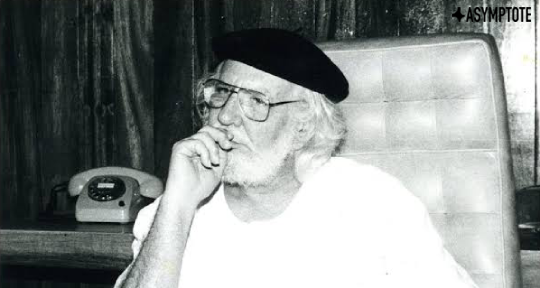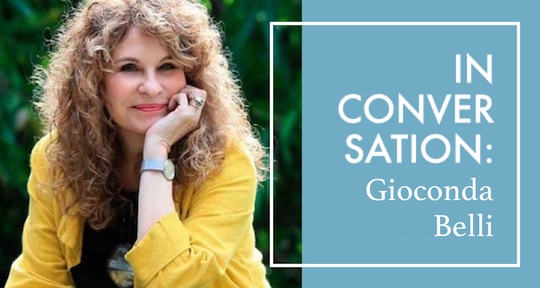From the Indonesian Feature in the Summer edition, I was intrigued by the poems of Nirwan Dewanto, in vivid translations by John H. McGlynn, including “The Way to the Museum,” which begins with “All eyeballs dipped in the vinegar of the bourgeoisie will become pickled eyeballs” and continues, in long lines, to contemplate class, blindness, and revolution. It resonated against the pathos and absurdity in excerpts from Ulrike Draesner’s Schwitters, translated by Sharon Howe, and Tatiana Niculescu’s play Brancusi v. United States, fresh portraits of European Modernist artists Kurt Schwitters and Constantin Brâncuși, respectively. In each case, as the exile of the artist comes to the fore, the language of their place of origin is woven into the text, along with glimmers of humor. I particularly appreciated the note from Niculescu’s translator Amanda L. Andrei, which describes the process of working, as a heritage speaker, with her father Codin Andrei: “The emotional challenge [of translating this work] lies in my own hang-ups of being a non-native speaker due to political and historical forces beyond my control. When we co-translate, my father and I converse about Romanian culture from a perspective free of Western stereotypes of communism, vampires, and oppression, and we are delighted.” Finally, I was swept up in the atmospheric excerpt from Habib Tengour’s Women of the Odyssey (tr. Teresa Villa-Ignacio) while listening to Tengour’s mellifluous reading of the subtle text in French, describing those who console themselves by “sticking ear in seashell” or the “Unfinished / Wave bringing you to the threshold.”
—Heather Green, Visual Editor
I adore the rush of the speaker’s voice in Enrico Remmert’s The War of the Murazzi (tr. Antonella Lettieri), and its syntactical verbality, meandering but never losing control, digressing into tightness, into an accumulation of narrative stress. I love as well the narrator’s contextualisations of the backdrop of Turin and its historico-social problems with violence, particularly in a refugee context: Turin feels masterfully integrated into the plotline, like a combattant in the Murazzi war itself, and the vivacity of its violence continues running, naturalistic, organic, as the “river never stops running.”
The textuality of Mateo Díaz Choza’s Precipitations (tr. Lowry Pressly) is staggering: the dual columns that inform multiple methods of reading the poem, as well as the materiality of the poem, almost transforming it into an object itself. The way the words waterfall down the screen mimic the “drop,” a kind of fall from heaven, in a mode that lends itself to the digital form undoubtedly better than it would a magazine or a standard-format book, in the “depths of the page” that ultimately do not supercede the infinite scroll of the screen. When the poem’s substance and words meet and meld into each other, the poem’s two columns also merge into one, into the “weather,” “snow-mute” but “beautiful” in the void of its meaning. Choza creates an aesthetics of decay, of death, of abandonment, but of regeneration as well. The drop recurs again and again; the speaker will continue to recognise his lover, again and again.
I love the adventure of Amyr Klink’s One Hundred Days Between Sky and Sea (tr. Rachel Morgenstern-Clarren), the sense of movement through space and time that underpins the narrator’s paradoxical stillness, immobility. It is remininescent of Jules Verne’s Voyages extraordinaires, venturing beneath the sea or into the heart of volcanoes, on a journey pushing against the boundaries of human capacity. Klink melds the joy and exuberance of a child discovering the world with a practical, didactical style of writing that underpins the veracity of his voyage. I find this piece particularly apt for Asymptote as a vessel in the sea of understanding, a buoy of translation in the archipelago of languages.
I appreciate Asymptote‘s continued dedication to featuring Ukrainian writing in each issue, particularly Ukrainian writing about the Russian invasion. In my view, this is one of the most essential tasks of literature in translation: to continually draw attention to the diversity of global experiences; to remind us that our lives are not insular, that we are not islands. To that end, I found Anton Filatov’s Finding Myself at War (tr. Patricia Dubrava) both heart-wrenching and vital. As his “eyes bleed” before the cruelty of false news stories, so do readers’ eyes before the horrors of Ukrainian soldiers’ war experiences. They are given voice not in those news stories, but in literature. Sharing their stories—and I love the detail of the abandoned cat, ironically (or not?) named Death, as well as the final section on cinema—is an act of taken care.
I find Nicole Wong’s discussion of translation theory in The Terroir of a Single Work: Redefining Scope in Approaches to Translation incredibly pertinent and eloquent, and I particularly enjoy the ‘close reading’ section where she dissects her own translation of Proust. It’s a priviledge to experience the clarity and sharpness of such a mind through this piece. Her style is reminescent of Kundera’s narrator in The Unbearable Lightness of Being: playful, heavy on metaphor without falling into abstraction, clear, enlightening (and bearably so!). Since reading this piece, I’ve found myself returning to it as I internalise and integrate her analysis into my own understanding of translation.
—Michelle Chan Schmidt, Assistant Editor (Fiction)
READ MORE…









